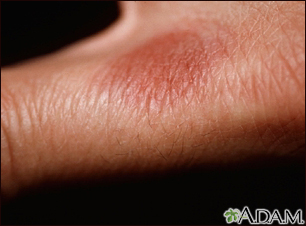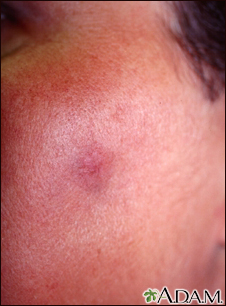Drug allergies
Allergic reaction - drug (medication); Drug hypersensitivity; Medication hypersensitivity
Drug allergies are a group of symptoms caused by an allergic reaction to a drug (medicine).

Anaphylaxis is an acute systemic (whole body) type of allergic reaction which occurs when a person has become sensitized to a certain substance or allergen and is again exposed to the allergen. Some drugs, such as those used for pain relief or for x-rays, may cause an anaphylactoid reaction on first exposure. Histamines and other substances released into the bloodstream cause blood vessels to dilate and tissues to swell. Anaphylaxis may be life threatening if obstruction of the airway occurs, if blood pressure drops, or if heart arrhythmias occur.

Hives are raised red welts of various size on the surface of the skin, often itchy, which come and go. Also called uticaria, hives is usually part of an allergic reaction to drugs or food. The term dermatitis describes an inflammatory response of the skin, caused by contact with allergens or irritants, exposure to sunlight, or by poor circulation, even stress. AVOID SCRATCHING. Scratching the rash may spread the inflammation, lead to infection and even leave scars.

A true allergy to a medication is different than a simple adverse reaction to the drug. The allergic reaction occurs when the immune system, having been exposed to the drug before, creates antibodies to it. On subsequent exposure to the drug these antibodies cause release of histamines. If severe, this reaction can result in a life-threatening situation known as anaphylactic shock.

This picture shows a skin inflammation (dermatitis) caused by contact with a material that causes an allergic reaction in this person. Contact dermatitis is a relatively common condition, and can be caused by many substances.

This is a close-up of a dermatitis reaction. It consists of a large, red (erythematous) lesion (plaque) with numerous small pus-filled areas (pustules).

This drug rash was caused by Tegretol. Medications can cause many different skin reactions, with varying rashes.

Medications can cause many skin reactions. This particular appearance is called a fixed drug eruption and was caused by a reaction to ceftazidime. This type of reaction typically recurs in exactly the same location when the person takes the same medication again.

Medications can cause many different types of skin reactions. This particular appearance is called a fixed drug eruption. This type of reaction typically happens in the same location when the person uses the same medication again.

Medications can cause many skin reactions. This particular rash, seen here on the cheek, is called a fixed drug eruption. This type of reaction typically occurs in the same location when the person uses the same medication again.

Many medications may produce allergic rashes. This individual has had an allergic reaction to ampicillin.

Antigens are large molecules (usually proteins) on the surface of cells, viruses, fungi, bacteria, and some non-living substances such as toxins, chemicals, drugs, and foreign particles. The immune system recognizes antigens and produces antibodies that destroy substances containing antigens.
Causes
A drug allergy involves an immune response in the body that produces an allergic reaction to a medicine.
The first time you take the medicine, you may have no problems. But, your body's immune system may produce a substance (antibody) against that drug. The next time you take the drug, the antibody may tell your white blood cells to make a chemical called histamine. Histamines and other chemicals cause your allergy symptoms. The reaction of the body when a drug allergy is present generally involves special cells called B and T cell lymphocytes.
Common allergy-causing drugs include:
- Drugs used to treat seizures
- Insulin (mainly insulin from animal sources)
- Substances containing iodine, such as x-ray contrast dyes (these can cause allergy-like reactions)
- Penicillin and related antibiotics
- Sulfa drugs
Most side effects of drugs are not due to an allergic reaction caused by the formation of IgE antibodies. For example, aspirin can cause hives or trigger asthma without involving the immune system. Many people confuse an unpleasant, but not serious, side effect of a medicine (such as nausea) with a drug allergy.
Symptoms
Most drug allergies cause minor skin rashes and hives. These symptoms may occur right away or hours after receiving the drug. Serum sickness is a delayed type of reaction that occurs a week or more after you are exposed to a medicine or vaccine. Drug allergies can also be associated with low blood counts.
Common symptoms of a drug allergy include:
- Hives
- Itching of the skin or eyes (common)
- Skin rash (common)
- Swelling of the lips, tongue, or face
- Wheezing
Symptoms of anaphylaxis include:
- Abdominal pain or cramping
- Confusion
- Diarrhea
- Difficulty breathing with wheezing or hoarse voice
- Dizziness
- Fainting, lightheadedness
- Hives over different parts of the body
- Nausea, vomiting
- Rapid pulse
- Sensation of feeling the heart beat (palpitations)
Exams and Tests
An examination may show:
- Decreased blood pressure
- Hives
- Rash
- Swelling of the lips, face, or tongue (angioedema)
- Wheezing
Skin testing may help diagnose an allergy to penicillin-type medicines. There are no good skin or blood tests to help diagnose other drug allergies.
If you have had allergy-like symptoms after taking a medicine or receiving contrast (dye) before getting an x-ray, your health care provider will often tell you that this is proof of a drug allergy. You do not need more testing.
Treatment
The goal of treatment is to relieve symptoms and prevent a severe reaction.
Treatment may include:
- Antihistamines to relieve mild symptoms such as rash, hives, and itching
- Bronchodilators such as albuterol to reduce asthma-like symptoms (moderate wheezing or cough)
- Corticosteroids applied to the skin, given by mouth, or given through a vein (intravenously)
- Epinephrine by injection to treat anaphylaxis
The offending medicine and similar drugs should be avoided. Make sure all your providers -- including dentists and hospital staff -- know about any drug allergies that you or your children have.
In some cases, drug allergy responds to desensitization. This treatment involves being given very small doses at first, followed by larger and larger doses of a medicine to improve your tolerance of the drug. This process should be done only by an allergist, when there is no alternative drug for you to take.
Outlook (Prognosis)
Most drug allergies respond to treatment. But sometimes, they can lead to severe asthma, anaphylaxis, or death.
When to Contact a Medical Professional
Contact your provider if you are taking a medicine and seem to be having a reaction to it.
Go to the emergency room or call the local emergency number (such as 911) if you have difficulty breathing or develop other symptoms of severe asthma or anaphylaxis. These are emergency conditions.
Prevention
There is generally no way to prevent a drug allergy.
If you have a known drug allergy, avoiding the drug is the best way to prevent an allergic reaction. You may also be told to avoid similar medicines.
In some cases, a provider may approve the use of a drug that causes an allergy if you are first treated with medicines that slow or block the immune response. These include corticosteroids (such as prednisone) and antihistamines. Do not try this without a provider's supervision. Pretreatment with corticosteroids and antihistamines has been shown to prevent allergic reactions in people who need to get x-ray contrast dye.
Your provider may also recommend desensitization.
References
Barksdale AN, Ross W. Allergy, anaphylaxis, and angioedema. In: Walls RM, ed. Rosen's Emergency Medicine: Concepts and Clinical Practice.10th ed. Philadelphia, PA: Elsevier; 2023:chap 106.
Castells M. Drug allergy. In: Goldman L, Cooney KA, eds. Goldman-Cecil Medicine. 27th ed. Philadelphia, PA: Elsevier; 2024:chap 234.
Solensky R, Phillips EJ. Drug allergy. In: Burks AW, Holgate ST, O'Hehir RE, et al, eds. Middleton's Allergy: Principles and Practice. 9th ed. Philadelphia, PA: Elsevier; 2020:chap 77.
Version Info
Last reviewed on: 3/31/2024
Reviewed by: Deborah Pedersen, MD, MS, Allergy & Asthma Care, PC, Taunton, MA. Review provided by VeriMed Healthcare Network. Also reviewed by David C. Dugdale, MD, Medical Director, Brenda Conaway, Editorial Director, and the A.D.A.M. Editorial team.
